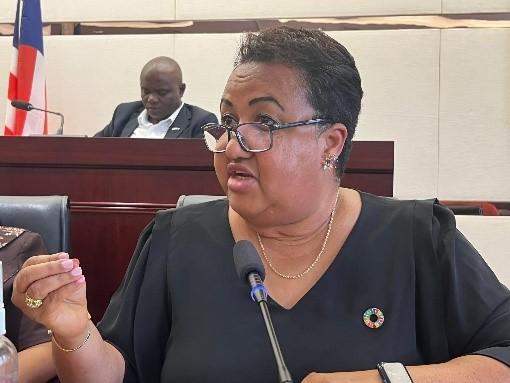Liberia: “We Do Have Blueprint for Rice,” Says Agriculture Minister

Agriculture Minister, Jeanine Milly Cooper
Contrary to the perception of some Liberians that the country does not have a comprehensive strategy to boost rice production, the Minister of Agriculture, Jeanine Cooper, has clarified that the country does have plans.
Speaking on ELBC yesterday, Cooper named the National Rice Development Strategy for Liberia and the Liberia Comprehensive Agriculture Sector Development Plan (LISIPII) as some of the strategic plans the country has in place to improve rice production.
“We have a blueprint for rice, which includes the National Rice Development Strategy for Liberia and the Liberia Comprehensive Agriculture Sector Development Plan (LISIPII) as well as the West African Rice Policy for the development of rice within Liberia,” she disclosed.
The Minister, however, did not mention public investment for rice, but said that the country stands to benefit from more support for domestic rice production from international partners.
The National Rice Development Strategy for Liberia was drafted two years ago while the Liberia Comprehensive Agriculture Sector Development Plan has been in place for the last 10 years.
LISIP, a domestication of the Malabo Declaration for Food and Nutrition Security, Africa’s Food Security Framework, calls for 10 percent of every African country’s total national budget to be appropriated for agriculture.
Cooper said during the radio talk show that highlighted various economic issues in Liberia that there is an increase in donors' ‘confidence in the country, thereby resulting in more private investment in agriculture.
“When we took over the ministry, it had been without a leader for several months, and many things were dormant. We managed to build more confidence in the sector and mobilize resources. But the government can’t do it alone; it also requires the involvement of the private sector. Our milestone has been to work with the private sector,” she explained.
Agriculture in Liberia has largely depended on donor support since the end of the 14-year civil war. During the 12 years of former President Ellen Johnson Sirleaf, the country benefited from close to 16 major food security and nutrition projects to reduce hunger and create jobs, according to the 2017 Zero Hunger Strategic Review report.
However, despite the level of investment in agriculture over the years, more challenges still faced agriculture and food security in Liberia.
The Agriculture Minister, who was summoned by the Senate last year to provide a comprehensive plan for addressing domestic rice production following Liberia’s experience of acute shortage of imported rice on the local market, said that her administration has brought about a lot of innovation for rice.
The Minister said that the country will only reduce its dependence on imported rice provided there is investment in large scale rice production.
According to her, smallholder rice farmers are unable to make Liberia self-sufficient in rice.
She mentioned that to stimulate the private sector, in recent years, the Ministry has empowered several farmers and agribusinesses.
“We currently have a few projects to support the sector in the various value chains. We met on a project when we took over, and we have developed new ones, which I am very proud about,” the Minister asserted. “Before this administration, most projects concentrated on rice and cassava. But my administration has included value chains such as livestock, rubber oil palm, to diversify support that could improve the economy.”
Cooper said that her ministry is using the Liberia Agriculture Commercialization Fund (LACF), a component of the projects at the ministry, to provide grants to beneficiaries.
The LACF, managed by Deloitte, a Ghanaian financial firm, has made the first batch of disbursements of funds worth US$2 million to 23 grantees in the rice, vegetable, and oil palm value chains after rigorous vetting and approval processes that lasted for about a year.
“This grant initiative is creating access to finance for agricultural businesses. It is a great opportunity because many people in the agriculture sector are unable to get money from commercial banks. Commercial banks are unwilling to give our loans to improve the sector,” she mentioned.
